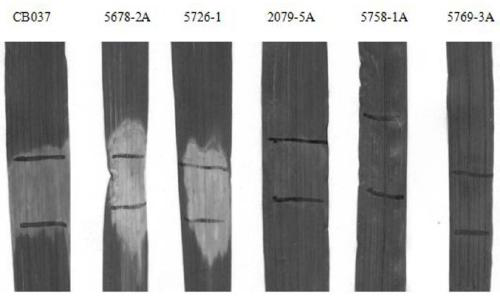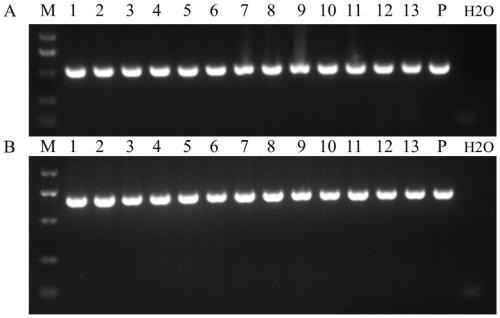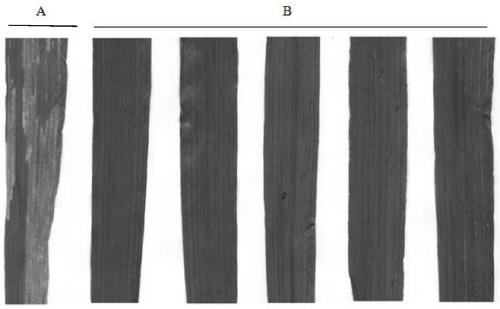Application of wheat stripe rust pstg_17694 gene in stripe rust control and breeding method of stripe rust resistant wheat
A technology for wheat stripe rust and wheat stripe rust, which is applied in the field of genetic engineering and crop molecular breeding, can solve the problems of small number of key pathogenic genes, difficulties in genetic research of wheat-stripe rust, and difficulty in genetic transformation, etc., to achieve inhibition Effects of Growth, Reproduction, and Significant Resistance to Wheat Stripe Rust
- Summary
- Abstract
- Description
- Claims
- Application Information
AI Technical Summary
Problems solved by technology
Method used
Image
Examples
Embodiment 1
[0039] (1) PCR amplification to obtain the PSTG_17694 gene fragment
[0040] Taking the complete genome sequence of wheat stripe rust physiological race PST-78 as a reference (GenBank accession number AJIL00000000.1 or BROAD download link ftp: / / ftp.broadinstitute.org / pub / annotation / fungi / puccinia / genomes / puccinia_striifo rmis_pst- 78 / ), using the coding region sequence of hypothetical protein gene PSTG_17694 (GenBank: KNE88861.1) as a template to design PCR primers.
[0041] Forward primer sequence CQM17694-F2, as shown in Seq ID No.3:
[0042] 5`-caagcggccgcTCATTCGACCAAAGAAAGGC-3`;
[0043] Reverse primer sequence CQM17694-R2, as shown in SeqID No.4:
[0044] 5`-tcaggcgcgccGATCACCTCGTTTCCATGCT-3`.
[0045] The length of the amplified segment is 490bp. Using the sequence alignment of the amplified segments to compare the whole genome data of wheat stripe rust PST-78 ( https: / / genome.jgi.doe.gov / Pucst_PST78_1 / Pucst_PST78_1.home.html ) and the NCBI database wheat stripe ru...
Embodiment 2
[0058] Embodiment 2 Anti-stripe rust resistance identification of wheat stripe rust
[0059] Propagation of fresh spores of wheat stripe rust: plant the susceptible variety Huixianhong in the greenhouse, inject the spore aqueous solution with a syringe during the one-leaf-one-heart stage, then spray water with a watering can and cover with a plastic film to keep it moist. Inoculation can be repeated 2-3 times to ensure full onset, with an interval of 1 week between each time. Preparation of the spore aqueous solution: Take the dried and frozen (-80°C) spores, suspend them with an appropriate amount of tap water until they are light orange, place them on a shaker at room temperature and shake them for 30 minutes (180rpm), and then inoculate them by injection. Sporadic disease can be seen about 20 days after inoculation, and a large number of leaves can be seen after about 30 days. A large number of fresh spores can be collected for inoculation identification of transgenic mater...
Embodiment 3
[0064] Example 3 Identification of PSTG_17694 Gene Expression in Stripe Rust-resistant Wheat
[0065] Twelve days after inoculation of wheat seedling leaves, the surface of wild-type CB037 leaves was covered with a large number of spore piles. About 100 mg of leaves of CB037 and transgenic materials were collected at different time points after inoculation, RNA was extracted by Trizol method, and cDNA was prepared for real-time fluorescent quantitative PCR. The real-time fluorescent quantitative PCR primer sequences are CQM_17694-F3 and CQM_17694-R3, and the specific primer sequences are shown in Seq ID No.7 and Seq ID No.8 in the sequence table. Taking the α-tubulin gene of wheat stripe rust as an internal reference (Huang Xueling et al., Journal of Agricultural Biotechnology, 2012, 20(2): 181-187), the primer TUBA-F / R sequences are shown in the sequence table Seq ID No.9, Seq ID No.10 is shown.
[0066]The PCR system is: 5 μl 2×SYBR GreenMaster, 1 μl each of the forward an...
PUM
 Login to View More
Login to View More Abstract
Description
Claims
Application Information
 Login to View More
Login to View More - R&D
- Intellectual Property
- Life Sciences
- Materials
- Tech Scout
- Unparalleled Data Quality
- Higher Quality Content
- 60% Fewer Hallucinations
Browse by: Latest US Patents, China's latest patents, Technical Efficacy Thesaurus, Application Domain, Technology Topic, Popular Technical Reports.
© 2025 PatSnap. All rights reserved.Legal|Privacy policy|Modern Slavery Act Transparency Statement|Sitemap|About US| Contact US: help@patsnap.com



